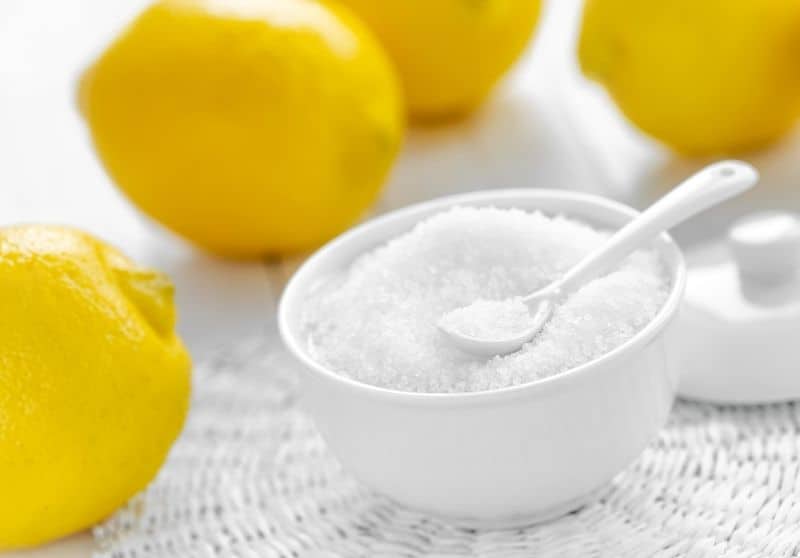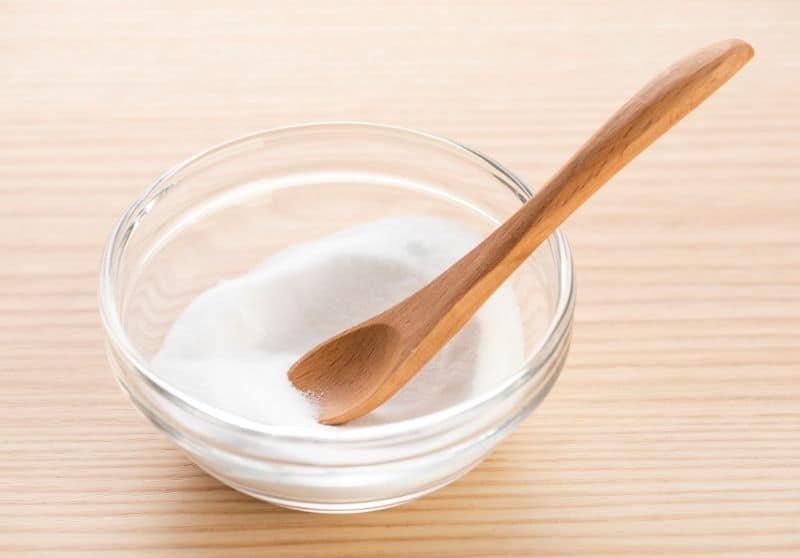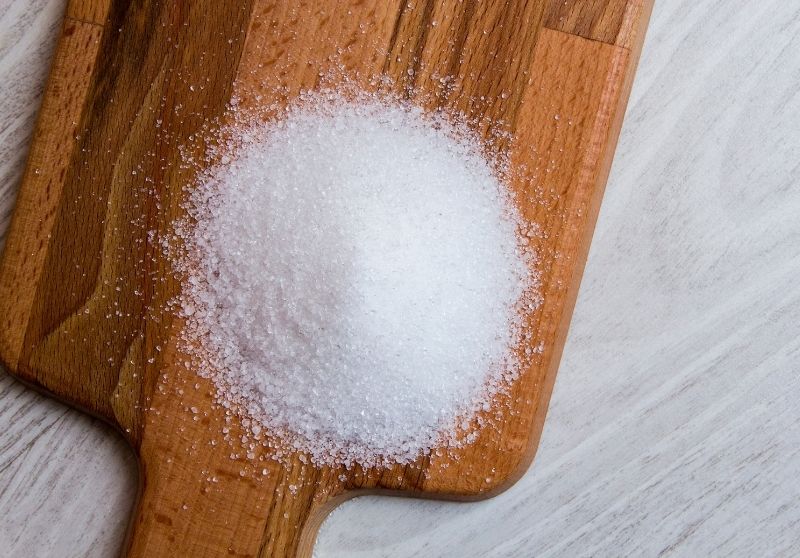Citric acid is a versatile ingredient with hair and skincare benefits. In this article, we will show you to remove hair dye with citric acid

Citric acid can remove hair dye. It reacts chemically with dye molecules, breaking them down and making them easier to remove. However, citric acid will not strip dye as much as bleach. Instead, it fades hair color gently, so it’s more effective for semi-permanent hair dye.
What Is Citric Acid?
Chemically speaking, citric acid is an alpha-hydroxy acid.
Alpha-hydroxy acids can be naturally occurring or synthetic and have widespread uses in beauty products.
The name comes from the fact that it’s commonly found in citrus fruits like lemon, lime, oranges, and grapefruits.
Lemon juice and lime juice contain 1.44 and 1.38 g/oz, respectively, and are the richest natural sources of citric acid.
Citric acid is also found in other non-citrus fruits like kiwis, pineapples, and tomatoes, albeit in lower amounts.
It’s also known as “sour salt” because of the tart taste it imparts. Citric acid is colorless, odorless, and a white, soluble, crystalline powder in concentrated form.
It’s a relatively weak acid with a pH of between 3-6 compared to a strong acid like hydrochloric acid, which has a pH of 1.5-3.5.
Its acidic nature makes it suitable as a preservative or pH buffer in hair products like shampoos, conditioners, and hair sprays.
Since it’s not economically viable to extract citric acid from citrus fruits, most of the citric acid used is synthetic.
Citric acid should not be confused with ascorbic acid/vitamin C, though they’re both acids commonly found in citrus fruits.
Another acid that may be able to fade or remove hair dye is phosphoric acid. This is an ingredient often added to carbonated drinks and as such, there is even some evidence to show that Coke can remove hair dye.
Is Citric Acid Good Or Bad For Hair?
Citric acid is generally good for hair based on the following benefits:
Restores pH Balance
As mentioned, citric acid is a weak, organic acid with a low pH. It’s highly suitable for your hair and scalp, which have an acid mantle.
As a result, citric acid is added to hair care products to lower the pH, so it sits within the correct pH range for improving your hair and scalp.
A low pH is beneficial because it keeps the cuticle tightly closed, and when moisture is locked in, your hair becomes soft, glossy, and manageable instead of dull, frizzy, and rough.
Strengthens Hair
There are claims that citric acid can stimulate hair follicles by boosting blood circulation.
Studies have shown that citric acid exhibits antioxidant activity, which can fight potentially damaging oxidizing agents that impact hair health.
Therefore, it helps keep hair follicles healthy, strengthens hair, and prevents breakage.
Removes Build-up
Citric acid is a chelating agent that binds to metals, making them soluble. It can remove hard water mineral build-up that’s difficult to remove with soap and water alone.
A citric acid rinse will likely leave your hair shiny and bouncy.
It also removes excess oil that’s weighing your hair down, causing greasiness.
The cleansing properties of citric acid make it a popular ingredient in dishwashing liquid.
Promotes A Healthy Scalp
Citric acid can improve your scalp’s condition in many ways. First, it’s an exfoliator that can unclog pores by removing dead skin cells, excess oil, and build-up.
It has antimicrobial properties that provide relief from itchy scalp caused by bacteria. This explains why citric acid is commonly sold as a disinfectant.
Does Citric Acid Remove Hair Dye?

Citric acid removes hair dye because it’s a natural bleach that destroys artificial pigment so that the dye molecules are easier to remove.
It’s the main active ingredient in lemon juice, well-known for its hair-lightening effects.
It’s commonly recommended to expose your hair to the sun after application as it’s said to activate the citric acid’s bleaching properties.
Citric acid works better on temporary or semi-permanent hair dye, which mainly deposits on the outer surface of your hair, hence the low color resistance.
Therefore, you can use citric acid to remove or fade semi-permanent hair dye in fewer washes.
However, it will not remove permanent hair color effectively because the dye molecules are locked inside the cortex.
It doesn’t help that the low pH tightens the cuticle layer, making sure no dye molecules escape.
You may be in luck if you have porous hair.
That means your hair’s cuticles are not tightly packed together, so the citric acid can penetrate the cortex and break down the dye molecules.
This happens through a redox or chemical reaction which breaks down dye molecules attached to hair fibers.
Even so, citric acid won’t completely remove hair dye. Like most DIY color removal methods, you can expect slight fading.
The results depend on your hair type, the type of dye used, and the intensity of the color.
How To Use Citric Acid To Remove Hair Dye

You can use citric acid powder or fresh lemon juice to remove hair dye.
Using Citric Acid Powder to Remove Hair Dye
- Mix citric acid powder with water in a bowl and set the solution aside.
- Shampoo your hair as normal.
- Follow up with a citric acid rinse and let your hair air dry. The citric acid will lighten your hair gradually, especially if you expose your hair to more sun.
- You can also use a citric acid scrub by mixing the powder to form a paste. Apply to hair and rub to remove dye molecules, then wash off.
Using Lemon Juice to Remove Hair Dye
- Squeeze fresh lemon juice into a bowl and evenly apply it to your hair.
- Wear a shower cap and let the lemon juice sit with your hair exposed to the sun before rinsing with warm water.
Tips for Using Citric Acid to Remove Hair Dye
- Citric acid is not particularly damaging to hair, so you can use it more frequently to gradually fade hair.
- Although citric acid is generally beneficial for hair, using too much of it might damage the cuticle, causing dryness and brittleness.
- To remove hair dye effectively, it’s essential to lift the cuticle so that more dyes can escape. Since citric acid tends to close the cuticle, you can use hot water and clarifying shampoo to open the cuticle.
- Lemon juice also contains Vitamin C, which has hair-lightening properties. Alternatively, you can combine the citric acid powder with crushed vitamin C tablets to enhance the results.
- Be sure to follow instructions when using citric acid powder, as it needs to be used in the right amounts to be safe and effective.
Disclaimer: This site is not intended to provide professional or medical advice. All of the content on LovedByCurls.com is for informational purposes only. All advice should be followed at your own discretion. Ingredients may change at any time so always check the product label before using. Check our full disclaimer policy here.
